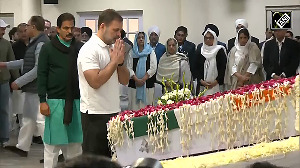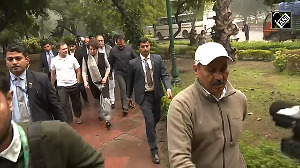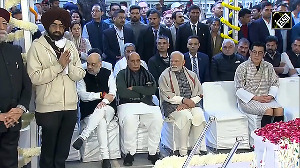The Government of India is 'committed' to the civilian nuclear deal with the United States, the top Indian diplomat in Washington has said, maintaining that New Delhi is only bound by the bilateral 123 Agreement that has been worked out by the two countries.
Indian Ambassador Ronen Sen's comments come ahead a crucial UPA-Left committee meet on the nuclear deal on March 17 in the face of an ultimatum by the Government's communist allies to make its stand clear on the agreement.
Sen emphasised that the governments in both the countries will have to go through the 'democratic process' before taking decisions and that neither of the parties would want to 'lecture' the other on what it should or should not do.
"As far as the status of the civilian nuclear cooperation agreement is concerned, I would like to say clearly and categorically that the government is committed to that," Sen told a large gathering at the Sigur Center for Asian Studies' India Initiative programme of George Washington University.
"There is still work in progress. We are a democracy and there are certain processes which have to be over and that is not complete; and we have to take subsequent steps from international forums," he said referring to the safeguards agreement with the International Atomic Energy Agency and an exemption from the Nuclear Suppliers Group.
The safeguards agreement, along with the NSG waiver, is a prerequisite to operationalise the Indo-US civil nuclear deal.
"We hope that these steps will be completed as soon as possible so that this agreement will come into force," the top Indian official said.
"As far as we are concerned, we are committed to the bilateral agreement which we have worked out after long negotiations. What we are bound by is the 123 Agreement," Sen stressed in response to a question.
"As far as the NSG, I don't want to anticipate what the conclusion will be, but we expect a clear exemption," he said.
No agreement on any issue can and will be long-lasting unless it is perceived to be of mutual benefit, he added.
"There is a debate going on in both our countries; as democracies we have to take decisions through our democratic process," the Indian envoy to the US said.
"But I don't think any of us would want to lecture the other on what we should do or should not do," Sen said.
In his opening remarks, Sen said the framework of the US-India bilateral relationship was based on shared values, common concerns and intersecting interests, not just in the short-term but also in the long-term and strategic aspects.
"The relationship is of mutual benefit. It is," he said.
Apart from the Ambassador, the seminar featured Ashley Tellis, a senior associate at the Carnegie Endowment and currently a senior foreign policy advisor to Republican presidential contender Senator John McCain.
Tellis argued that the India policy under a new Republican administration will reflect continuity for a number of reasons.
He said the growth of Indian power is good for America, the two countries have some common enemies like the rise of radical movements, the beneficial elements will be tighter as a result of the bonds between the two societies and further economic integration and a robust US-India relationship is good for the rest of the world.
"This is not about the containment of China. It is not realistic to think on those lines. India matters because it is large and important in its own right," Tellis said.
Former Assistant Secretary of State for South Asia Karl Inderfurth, currently representing the Democrats, said, "The sky is not the limit in the United States-India relations".
He said a Democratic administration will be equally interested in pushing several aspects of the bilateral relationship as it pertained to a nuclear-free world, the future of US-India defence relationship, counter-terrorism, the imperative of India being a permanent member of the UN Security Council and in bringing in India and China formally into the Group of Eight.






 © 2024 Rediff.com -
© 2024 Rediff.com -